- Ten British far-right activists barred from France for migrant harassment
- Waitress in helmet with sparklers among 40 casualties in Swiss bar fire
- UK Government Mulls X Block due to Grok AI Image Concerns
- Wingsuit pilot dies after 1,000ft mountain dive at 120mph
- US Forces Boldly Capture Russian-Flagged Oil Tanker Marinera in Atlantic
- US Spy Planes Gathering at RAF Bases in the UK
- UK Faces Heavy Snowfall as Storm Goretti Hits: What to Expect
- Who is Delcy Rodriguez, the Trump-supported new leader of Venezuela?
EU deal puts Britain back on global stage | Paper Talk UK
Bias Exposure
Tuesday’s newspaper front pages cover the landmark EU deal that, according to the prime minister, puts the UK back on the global stage. The paper’s political leanings are as clear as ever in this morning’s headlines with the left-leaning press celebrating the UK rebuilding its relations with the EU – and highlighting the economic benefits that will come with it. The right-leaning press sees it as a betrayal of Brexit – even though many of the papers have acknowledged that Brexit in its current form does not work.
The Times calls the deal, unveiled by the prime minister on Tuesday, a “new era” saying the trade deal with Brussels will secure cheaper food and energy. The paper says the Brexit reset will boost the economy by £9 billion a year.
EXPLAINER
This headline uses positive framing (“hails”, “new era”) to portray Keir Starmer’s stance on Brexit in an optimistic light. The phrase “Brexit reset” suggests a fresh start, which may downplay past tensions. It implies constructive progress without detailing specific outcomes, a common media tactic to evoke hope or stability while remaining vague.
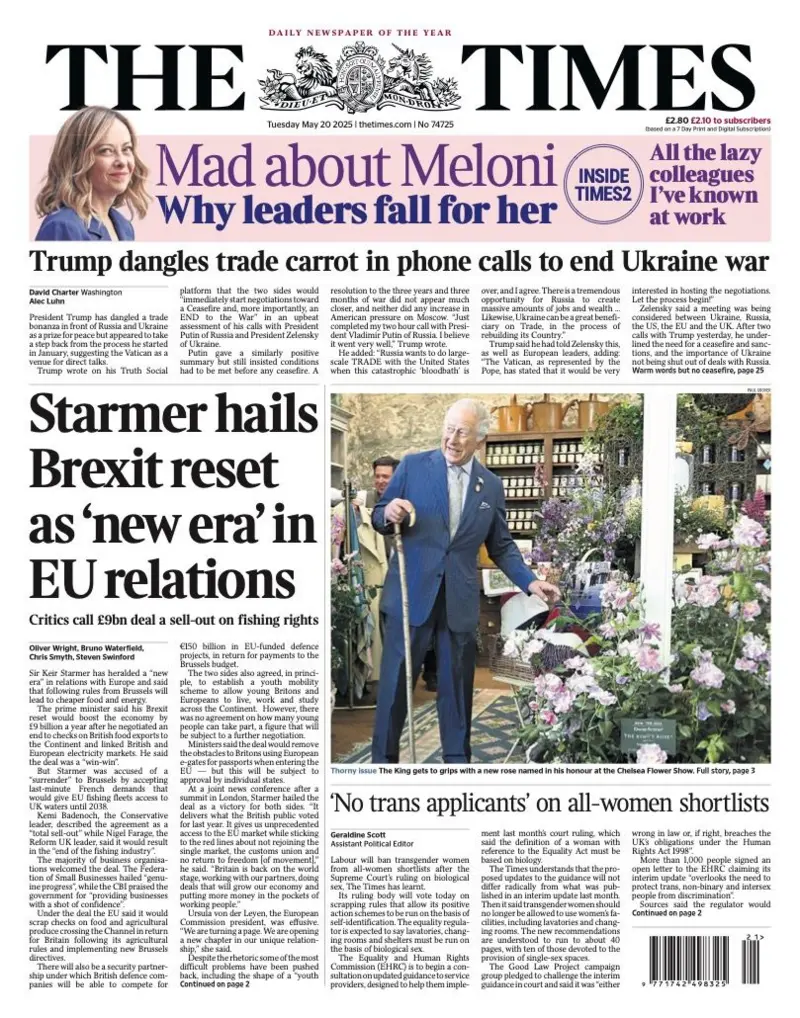
The Guardian says the prime minister’s pledge that the new “EU deal puts Britain back on the world stage” and is a “win-win” that grants “unprecedented access to the EU market”. The paper also highlights the reaction from opposition parties including Tory leader Kemi Badenoch who says the deal’s concessions on youth visas and fishing is a “surrender.”
EXPLAINER
This headline uses nationalistic and uplifting language (“puts Britain back on the world stage”) to frame the EU deal as a significant achievement. It implies that the UK had lost global influence and is now regaining it, aligning with a restorative narrative. Attributing the statement to Starmer (“says Starmer”) provides plausible deniability—the media reports his view without directly endorsing it, a common tactic to influence perception while appearing neutral.
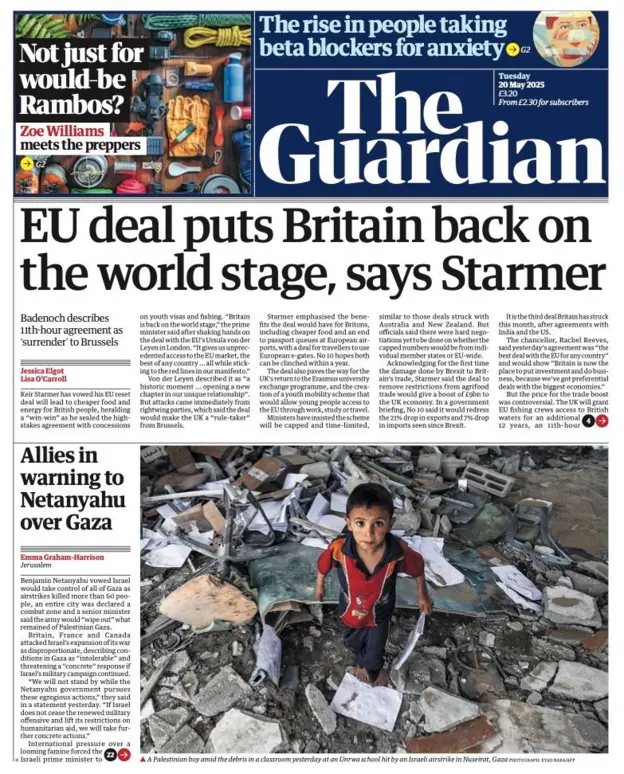
The FT says the prime minister’s summit is a “new chapter” for UK and EU relations. It adds that chancellor Rachel Reeves said she hoped it would lead to further EU deals to smooth trade.
EXPLAINER
This headline uses diplomatic and neutral language (“agree”, “reset”) to frame the event as cooperative and constructive. The term “showpiece summit” adds a sense of grandeur or importance, possibly overstating the event’s impact. The phrase “post-Brexit reset” suggests progress and a clean slate, a euphemistic tactic that may downplay previous conflict or complexity in UK-EU relations.

The i newspaper says the deal means “Britain wins food and defence deals after fishing climbdown” and predicts a “future clash on visas for under-30s”. The paper says under-30s visas are still not confirmed with the two sides “at loggerheads” over the number of young people who can come to the UK.
EXPLAINER
This headline uses a trade-off framing tactic—presenting “wins” (food and defence deals) to offset the “climbdown” on fishing, implying compromise. The term “climbdown” has a negative connotation, suggesting the UK gave ground, while “wins” puts a positive spin on the outcome. Mentioning a “future clash” on visas hints at ongoing tension, using conflict language to maintain reader interest and suggest instability.
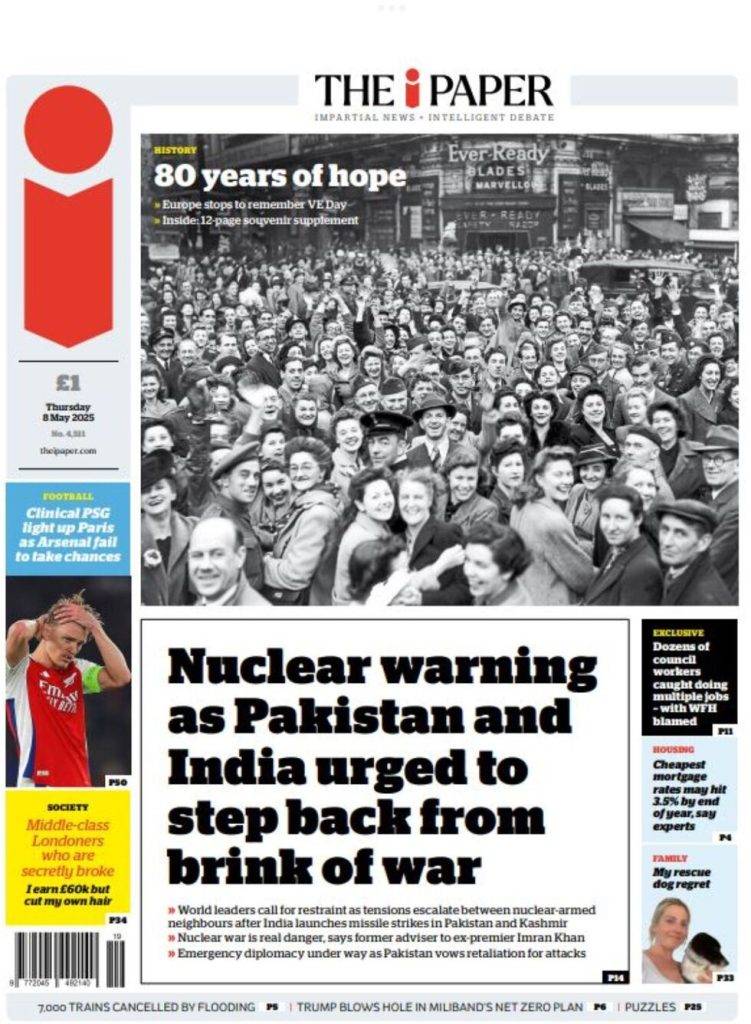
The Daily Telegraph suggests “Kiss goodbye to Brexit” saying that PM Starmer is being accused of attempting to “drag Britain back into the EU” with his new deal with Brussels.
EXPLAINER
This headline uses a provocative and emotionally charged phrase (“Kiss goodbye to Brexit”) to suggest a dramatic reversal or abandonment of Brexit. It employs sensationalism and implies betrayal or loss, likely appealing to strong feelings on both sides of the Brexit debate. The phrase is vague and lacks context, a common media tactic to spark curiosity or controversy.

The Daily Mail takes a negative stance on the deal highlighting the backlash and labelling it “Starmer’s surrender.” The paper reports that the PM is being accused of a “great Brexit betrayal” after agreeing to a deal that hands Brussels control of British laws, money and fish.
EXPLAINER
This headline uses loaded, emotive language—”surrender” implies weakness, defeat, or betrayal, especially in political or nationalistic contexts. It reflects a strongly biased or adversarial stance, likely aiming to provoke anger or criticism. This is a classic example of framing through word choice, where a neutral or diplomatic action is cast in a negative, confrontational light to shape public perception.
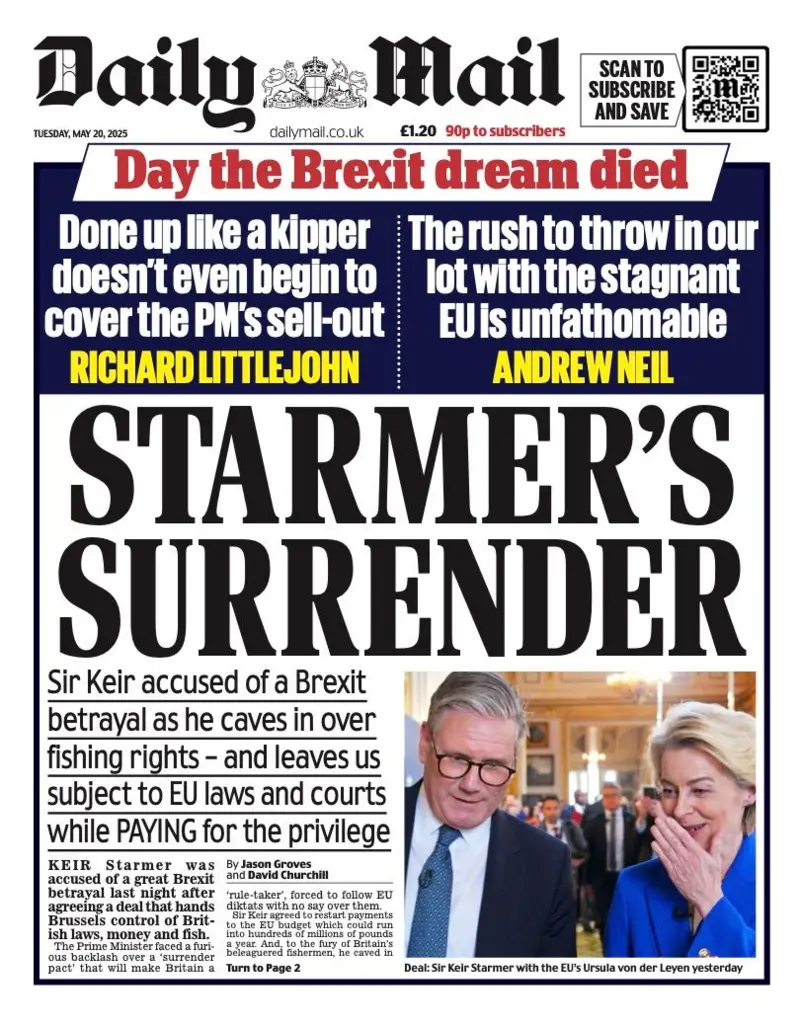
The Daily Telegraph suggests “Kiss goodbye to Brexit” saying that PM Starmer is being accused of attempting to “drag Britain back into the EU” with his new deal with Brussels.
EXPLAINER
This headline uses highly emotive and inflammatory language—terms like “abject surrender” and “betrayal” are designed to provoke outrage. It frames Starmer’s actions as a complete capitulation and a violation of national trust, especially among pro-Brexit audiences. The phrase “Brexit Britain” appeals to nationalist sentiment, making this a clear example of partisan bias and loaded framing meant to stir strong emotional reactions rather than inform.
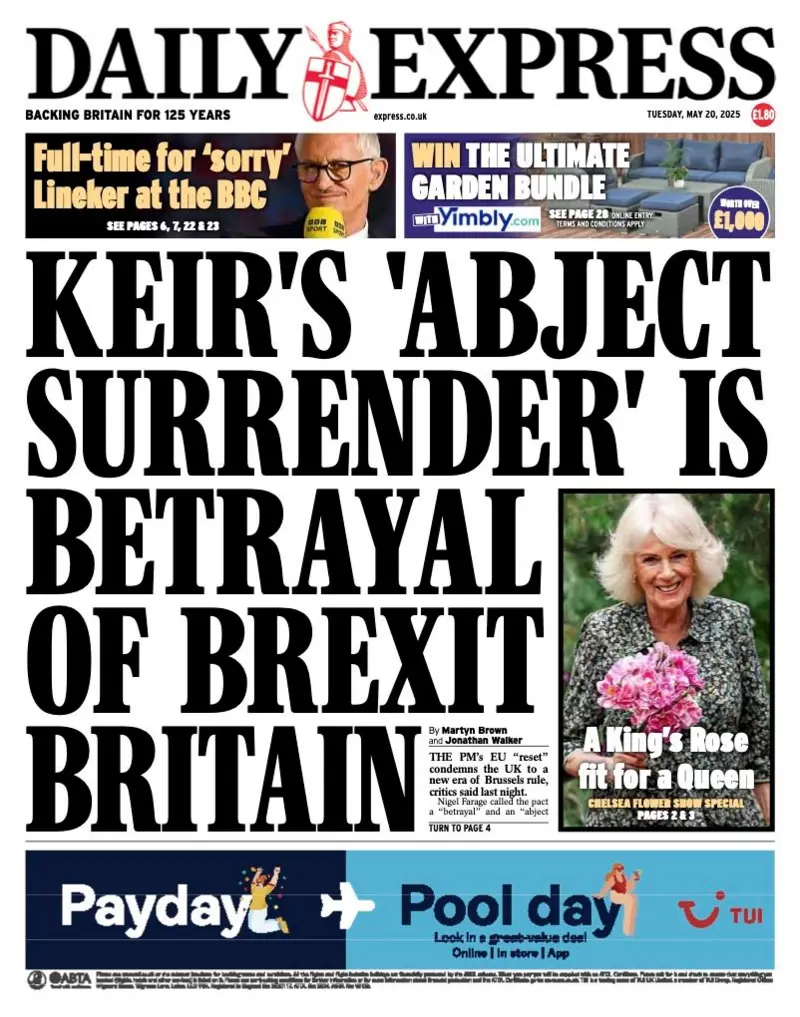
Metro says “Brexit battle 2 begins” reporting Brexiteers are taking aim at the prime minister in a “bruising new battle” with accusations he “sold out the fisherman and signed Britain up to Europe’s rules out.”
EXPLAINER
The headline “Brexit Battle 2” uses dramatic, conflict-driven language, framing current developments as a sequel to the original Brexit struggle. The use of “battle” implies confrontation and high stakes, even if the situation may be more diplomatic or technical. This is a classic sensationalist tactic, reducing complex negotiations to a simple fight narrative to grab attention and stir emotion.
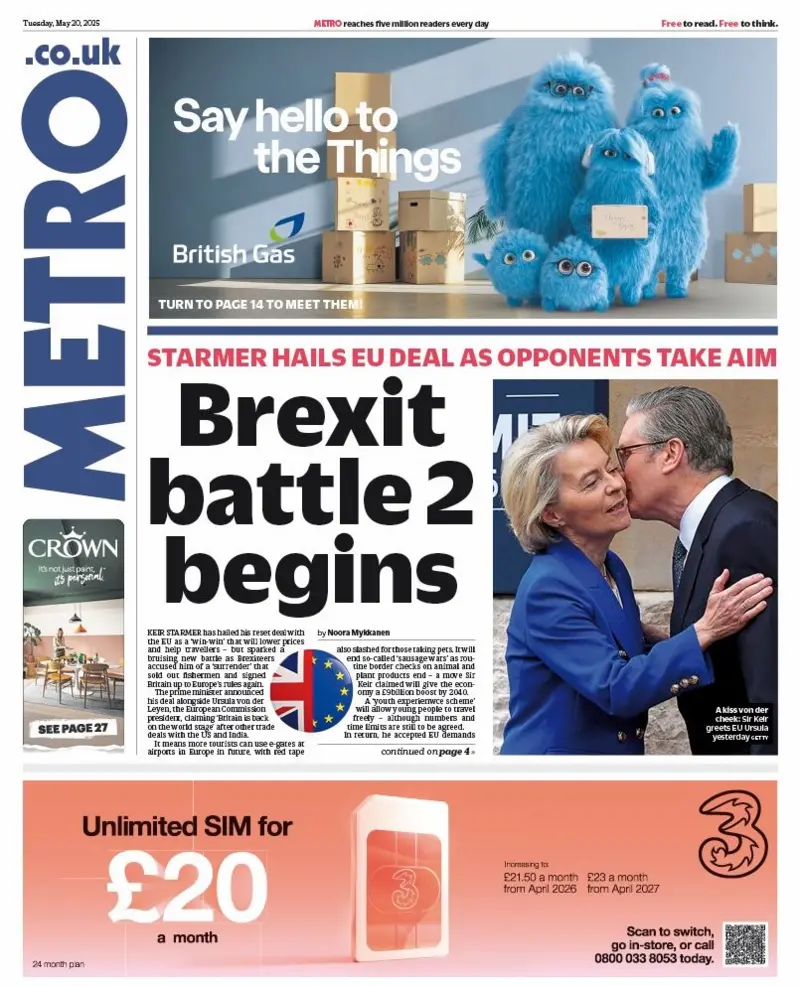
The Daily Star tackles the backlash against the PM with a blunt assessment from former prime minister Boris Johnson who says Starmer is an “orange ball-chewing gimp.”
EXPLAINER
The headline “PM’s in a tight spot” uses colloquial and vague language to suggest the Prime Minister is facing difficulty without specifying the issue. This is a soft criticism tactic, implying trouble while avoiding harsh or direct accusations. It invites curiosity and speculation, a common media strategy to draw readers in while maintaining a casual, accessible tone.

The Sun sees the deal as a “bow down to EU judges” and suggests it will “throw open our borders”. The paper says the UK was ambushed by a late demand or, as the paper puts it, “12 more years of French and Spanish trawlers plundering our waters”.
EXPLAINER
The headline “Brexit Battle 2” uses dramatic, conflict-driven language, framing current developments as a sequel to the original Brexit struggle. The use of “battle” implies confrontation and high stakes, even if the situation may be more diplomatic or technical. This is a classic sensationalist tactic, reducing complex negotiations to a simple fight narrative to grab attention and stir emotion.
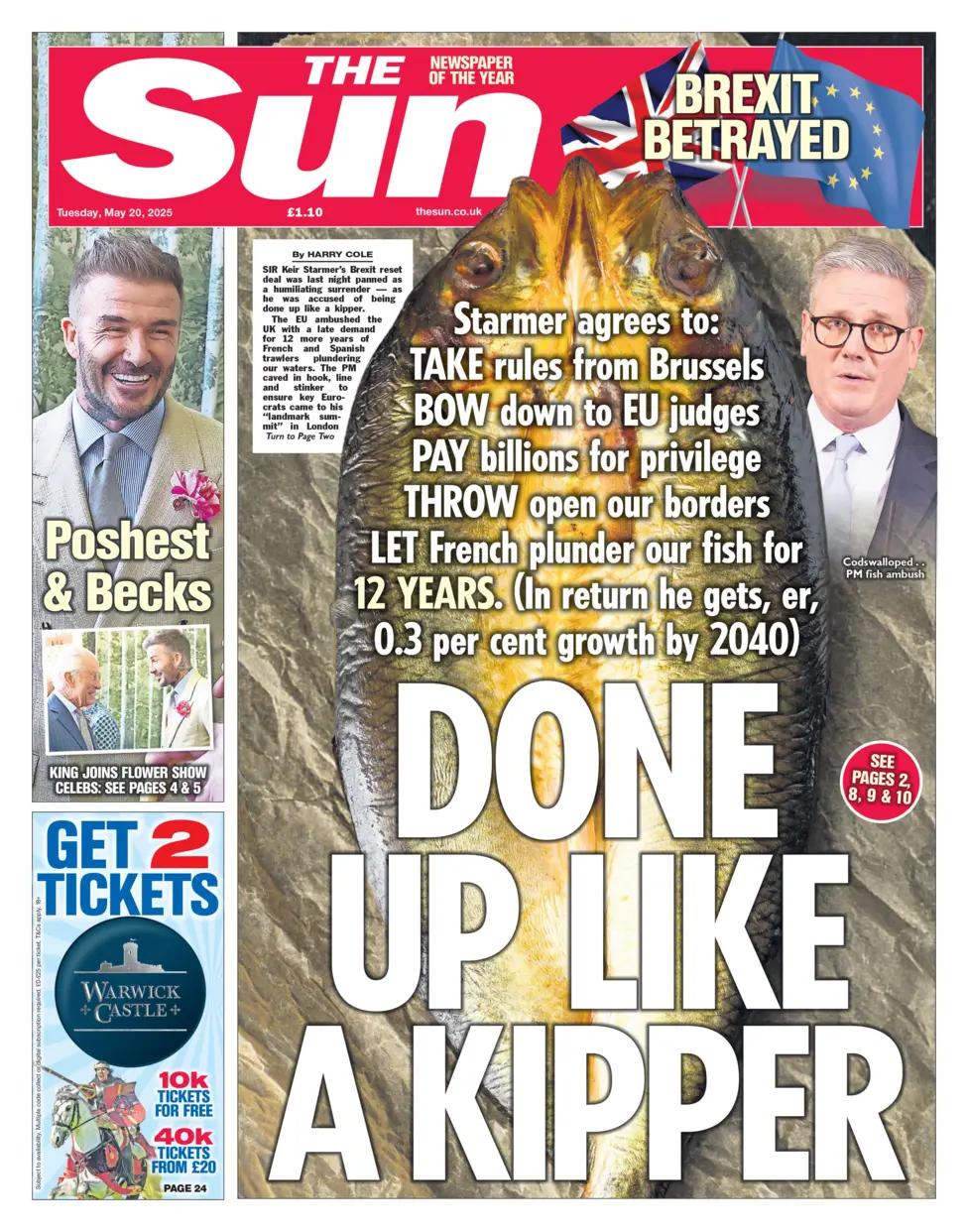
Subscribe to Updates
Get the latest creative news from FooBar about art, design and business.

